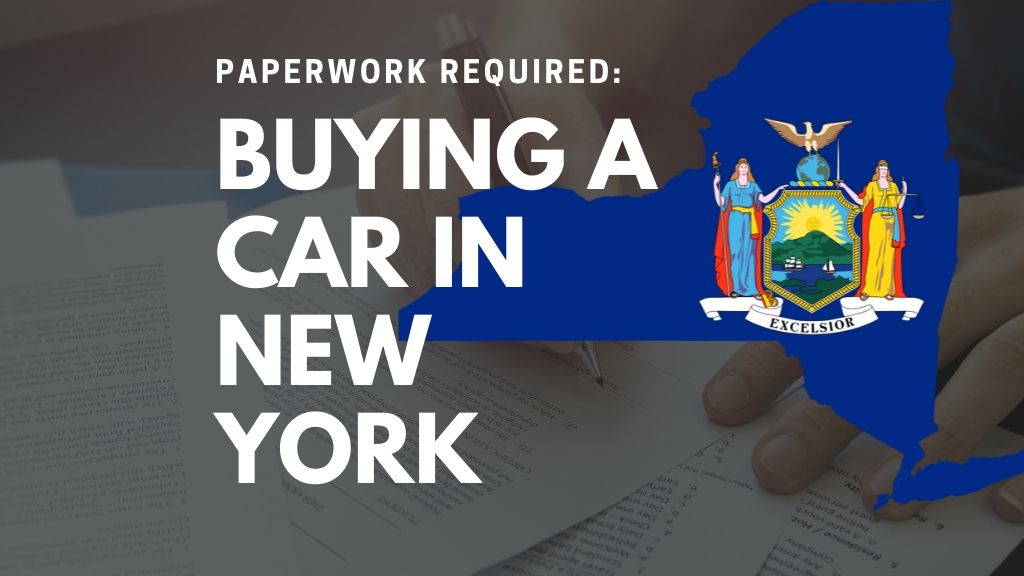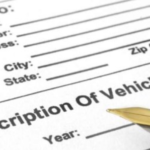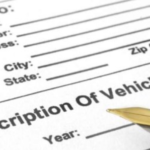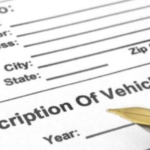Last Updated on June 25, 2020 by Jason Mason
If you are a resident of New York planning to purchase a car, expect to handle some paperwork in order to register and title the car in your name. If you are planning to purchase the car from a New York dealer, they will handle all the required paperwork on your behalf. However, if you intend to use a private seller, be ready to handle paperwork for registration and titling yourself at the New York Department of Motor Vehicles (DMV). Continue reading this article to get more information about the paperwork required when buying a car in New York.
Important note when purchasing a vehicle in New York
In New York, you can only purchase a new car from licensed dealers. These dealers are normally partnered with automobile manufacturers to sell vehicles in New York. These dealers are licensed by the New York DMV Division of Vehicle Safety Services. The law requires dealers to inform you about the states of the vehicle.
- If you are purchasing a used vehicle, the dealer must certify in writing that the vehicle is in good condition.
- All the emissions controls and safety equipments required must be included.
- The vehicle must have undergone emission inspection testing and other forms of inspection within 30 days of delivery.
- Dealers selling news cars must repair the problem on the vehicle under the manufacturer’s warranty.
- The bill of sale must indicate the status of the vehicle: whether new, used, salvaged, rebuilt, reconstructed or not manufactured to U.S. standards.
- The dealer must provide the buyer with the salvage disclosure statements and record the odometer reading. If you are financing your vehicle through a loan, the dealer must handle all the paperwork for registration and titling on your behalf.
Registering Your Vehicle In New York
The steps of processing paperwork for vehicle registration and titling are easy. Get the following documentation from the seller:
- Proof of vehicle ownership. If you intend to purchase a vehicle built from 1973 onwards, you need a bill of sale and title signed over to you. If you intend to go for vehicles older than 1973, you need to obtain the transferable New York registration or proof of ownership if you are purchasing the car from another state.
- Damage disclosure and odometer reading statement. If the back of the title doesn’t have space for this information, use Form MV-103. Vehicles older than 8 years do not require damage disclosure and vehicles older than 10 years do not require odometer reading.
- Proof of purchase price or gift.
- Lienholder’s original document to show that the lien is satisfied. Examine the title certificate carefully to see whether there are any unsatisfied liens.
At this point, you don’t need to worry about paying sales tax. You will pay tax at the time of vehicle registration and titling. When you purchase a vehicle through a dealer, they will handle the required documentation on your behalf.
Can I register a vehicle without a title in New York?
You cannot complete any transaction without a title. The seller must provide a copy of title certificate to you at the time of vehicle purchase. If this document is missing, damaged or lost, ask the seller to apply for a duplicate copy and give it to you. If the seller has not provided a valid title certificate after selling the vehicle to you, send a written letter asking him to do so. The seller will have up to 10 days to respond. If they fail to respond, then take the following to the New York DMV office:
- The unopened returned certified letter.
- Police statement, pencil tracing or a photo with the VIN.
- A notarized affidavit explaining what happened.
- Any other proof of ownership, like bill of sale or cancelled check.
- A completed Form MV-51B (Statement of Ownership for Non-Titled Vehicles, All-Terrain Vehicles, Boats and Snowmobiles).
If you need more information or have any question, contact the New York Title Services Bureau through hotline (518) 486-4714.
Auto Insurance Requirement
When registering your car, you must show proof of insurance. Proof of insurance can be an insurance ID card issued by your car insurance when you purchase their coverage. This card must be issued to the DMV and a copy kept in your car all the time. Your car insurance provider must notify the DMV when you purchase required minimum car insurance from them. The DMV will then verify the status of your car insurance electronically with your card. You must also show proof of insurance when you are pulled over by a police officer.
In New York, you must purchase the following car insurances for your registered vehicles:
- Liability car insurance
- No-fault auto insurance
- Uninsured motorist insurance.
Liability Insurance
Liability car insurance will help you cover the cost of property damages and injuries resulting from an accident that you cause. This policy does not cover your own personal costs. The following are minimums limits of liability insurance coverage:
- $25,000 for injuries to one person
- $50,000 for injuries to multiple people
- $50,000 for death to one person
- $100,000 for death to multiple people
- $10,000 for property damage.
No-Fault Insurance
New York also requires you to purchase no-fault or PIP insurance to help you cover your own medical expenses regardless of who was at fault after an accident. This policy has a limit of $50,000 per person to cover the following:
- Your medical expenses resulting from accidents
- 80% of lost income due to injuries suffered after an accident. The required limit is $2,000 per month for up to 3 years
- A $2,000 death benefit plus $50,000 limit
- Up to $25 of daily expenses for up to 1 year.
PIP policy will cover your medical costs before your health insurance. If your medical costs exceed your PIP coverage limit, your health insurance will come into effect.
Uninsured Motorists Coverage
Your New York car insurance policy must also include uninsured motorist coverage. This type of insurance policy will cover the cost of injuries that are brought by uninsured drivers. This insurance policy will not cover property damage. The following is the minimum limit for uninsured coverage:
- $25,000 for injuries to one person
- $50,000 for injuries to multiple people.
If fail to purchase car insurance, you must surrender your car’s license plates to the Department of Motor Vehicle immediately. If you fail to do so, your driver’s license and car registration will be suspended indefinitely. If your car insurance lapses, you must renew it or surrender your plates to avoid your driver’s license or car registration suspension. To reinstate your suspended driver’s license or vehicle registration, you must pay $100 fee.




